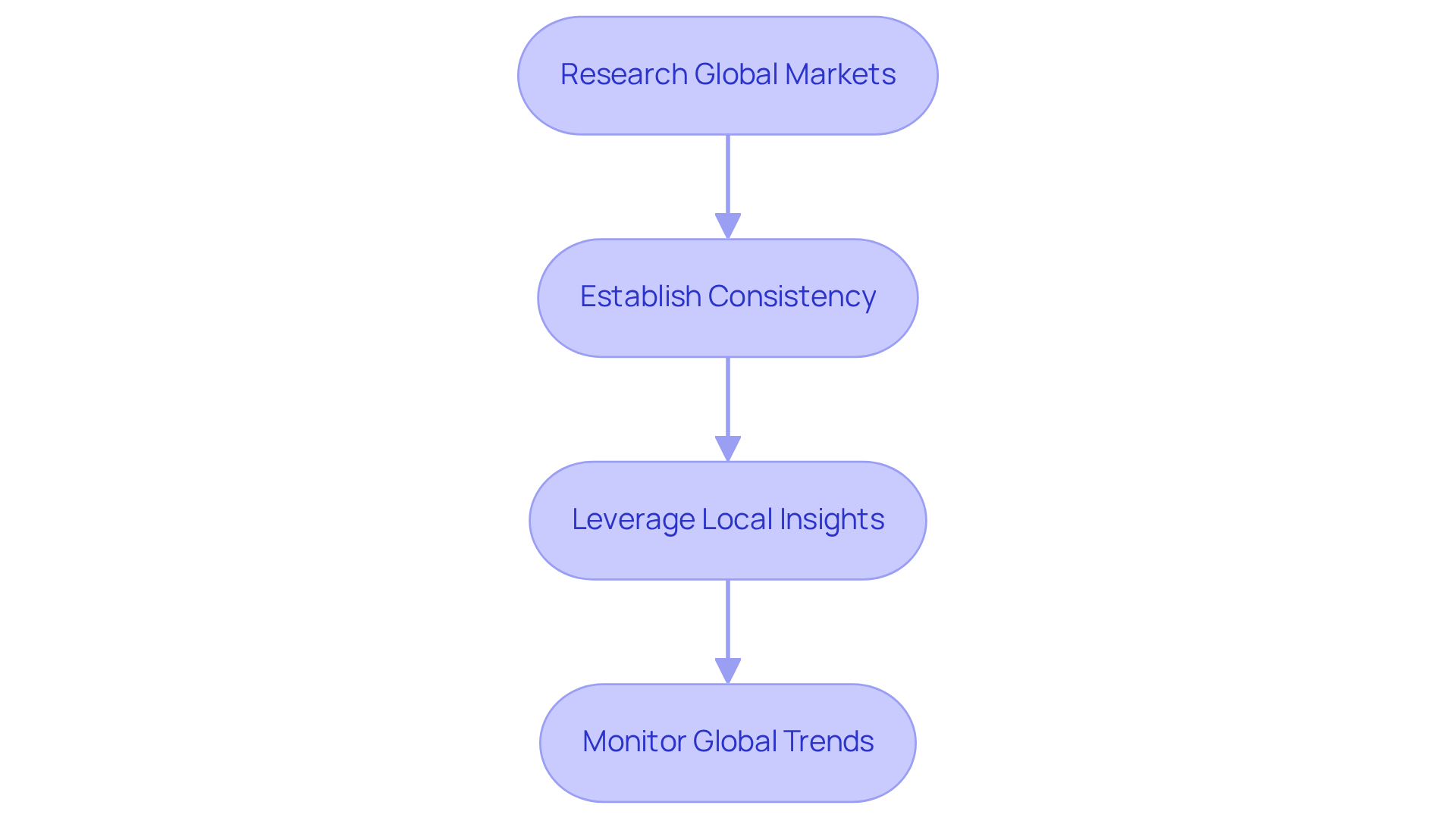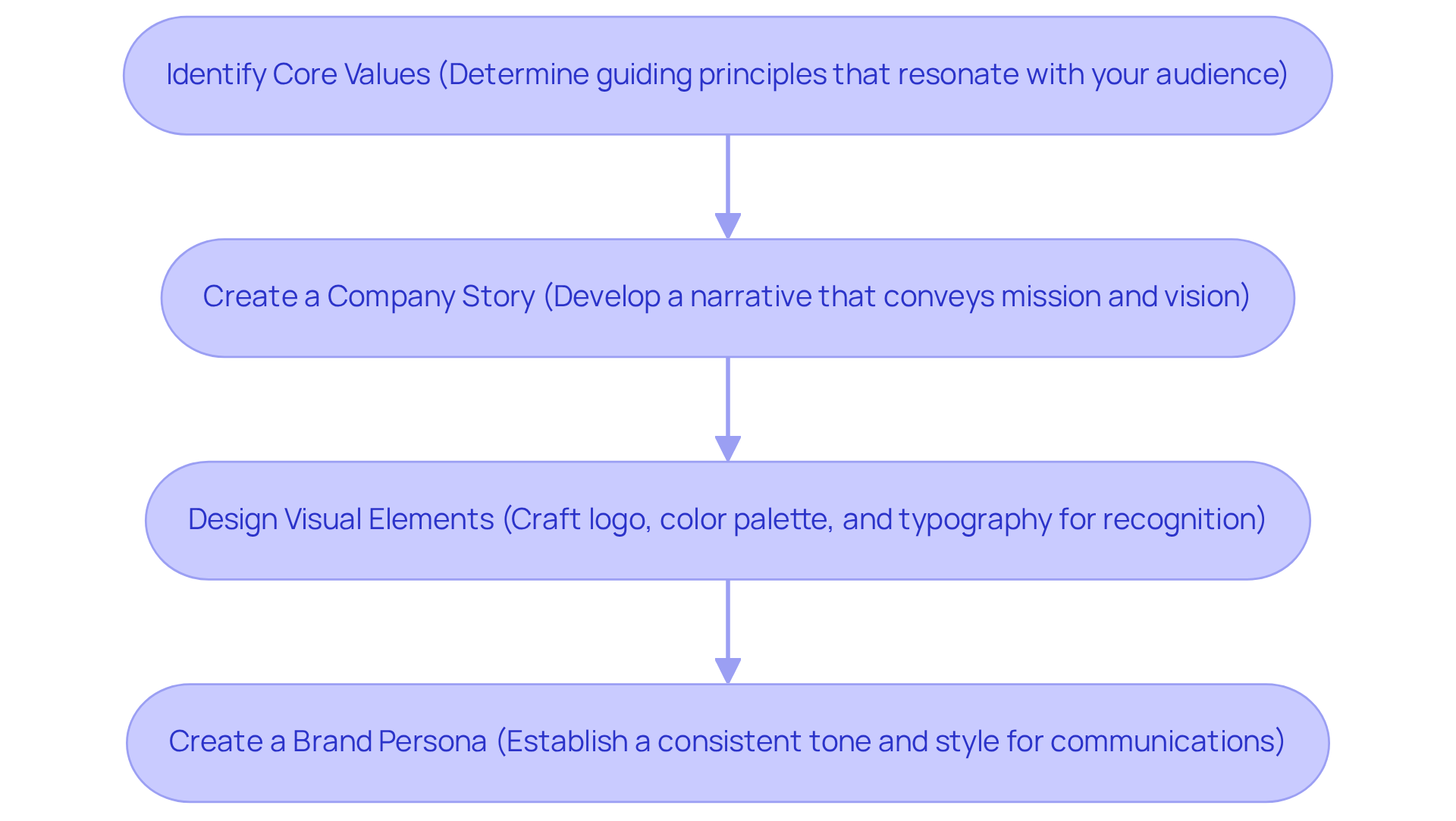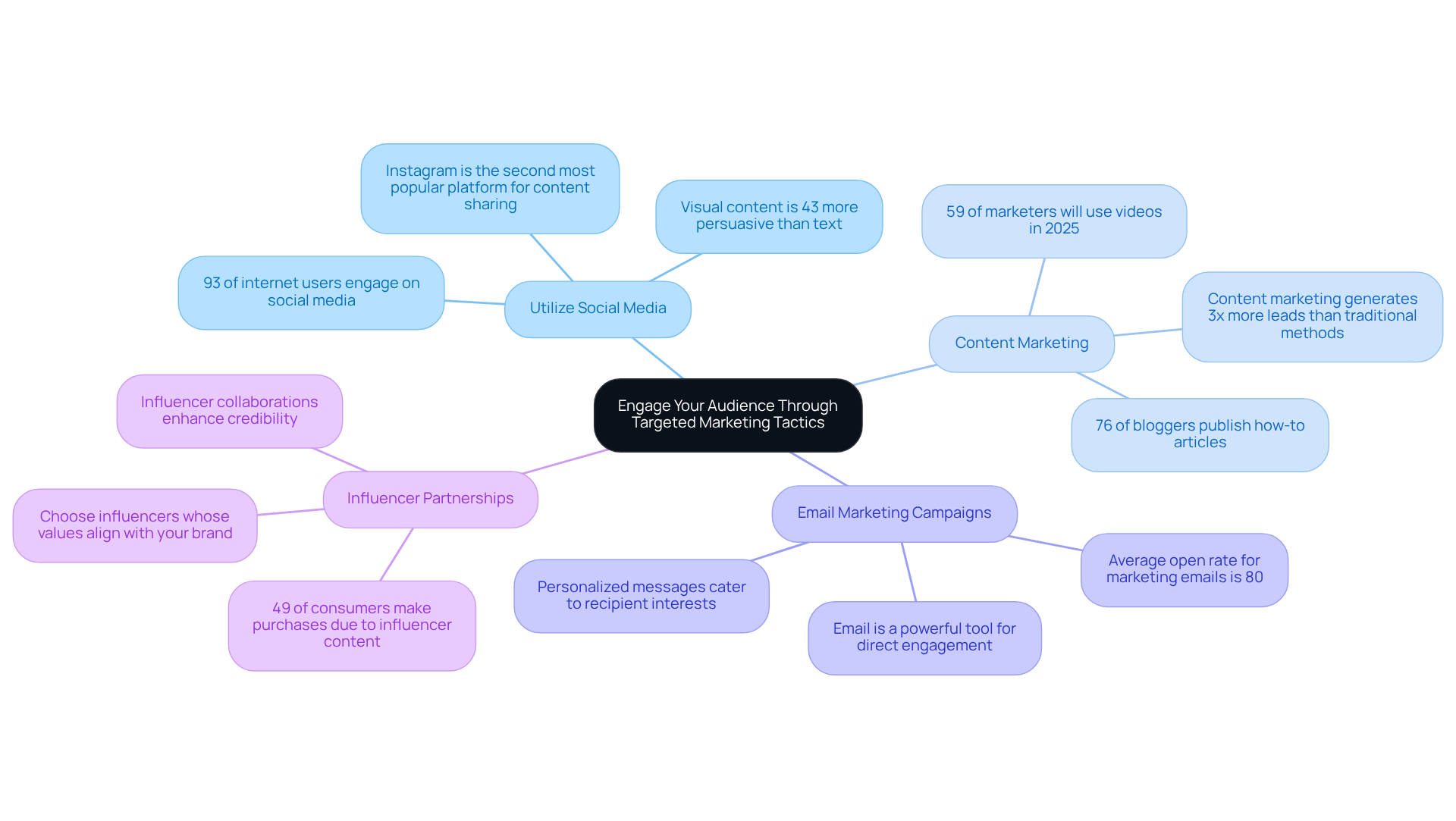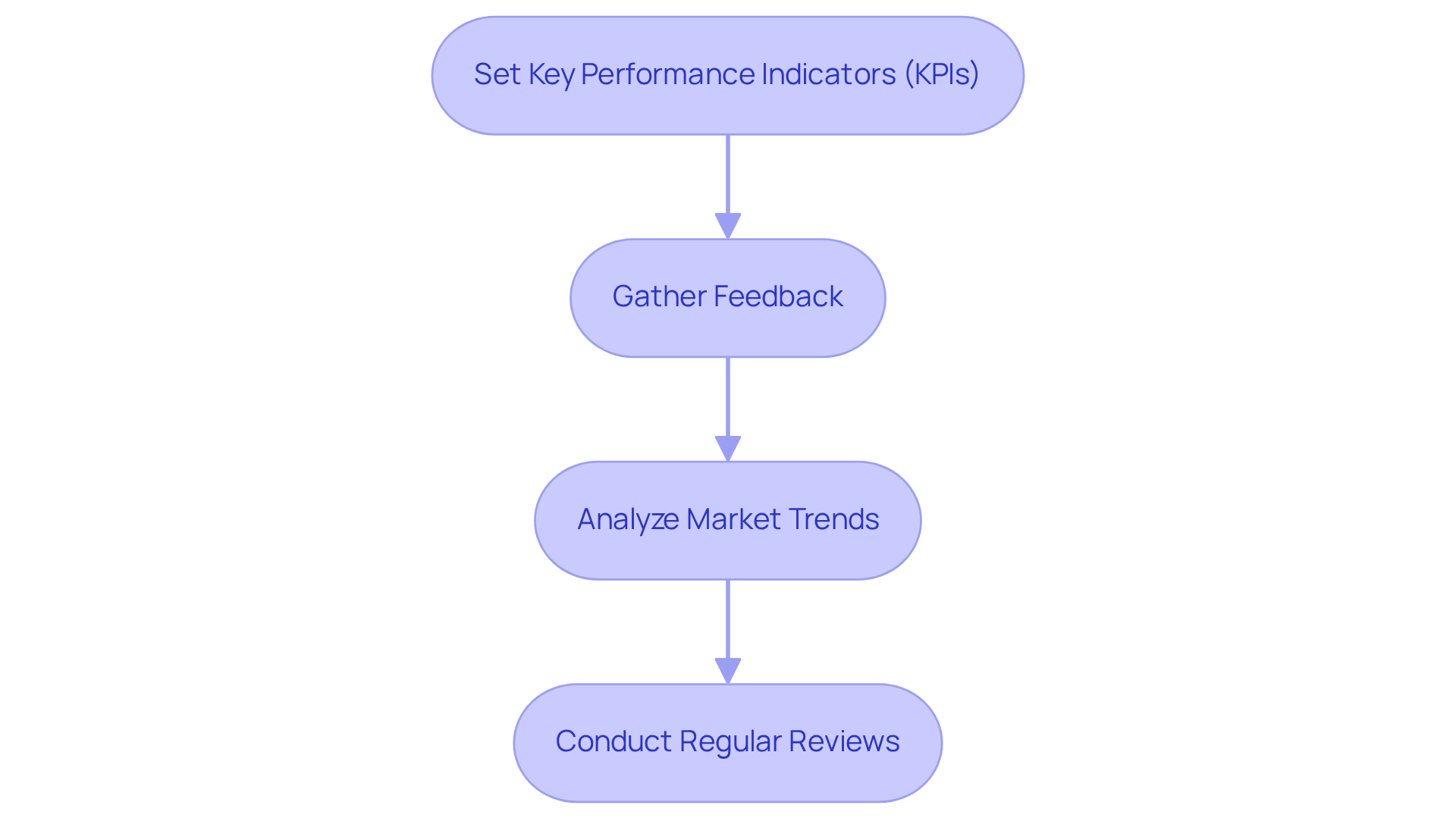Overview
In the journey of building a tech startup, one of the most pressing challenges is mastering worldwide branding. Many founders find themselves overwhelmed by the complexities of global markets and the need for a cohesive brand identity. This struggle can lead to feelings of isolation and uncertainty, as the fear of not resonating with diverse audiences looms large. However, there is hope. By following four critical steps, you can navigate this landscape with confidence and care.
- Researching global markets is essential. Understanding the unique characteristics of each market allows you to tailor your approach effectively.
- Establishing consistency across your branding efforts fosters trust and recognition, which are vital in a crowded marketplace.
- Leveraging local insights can provide invaluable perspectives that resonate deeply with your target audience.
- Monitoring global trends keeps you agile and responsive, ensuring your brand remains relevant.
Each of these steps is supported by practical strategies and examples that not only highlight the importance of a cohesive brand identity but also emphasize targeted marketing tactics. By embracing these approaches, you can foster customer loyalty and enhance your market presence, creating a brand that truly connects with people. Remember, you are not alone in this journey; many have faced similar challenges and emerged stronger on the other side.
Introduction
Creating a recognizable brand in the tech industry can feel overwhelming, particularly for those aspiring to reach a global audience. Many tech startups find that a well-defined global branding strategy is essential for unlocking new markets and forging meaningful connections with diverse audiences. Yet, the journey is fraught with challenges; maintaining a cohesive identity that resonates across different cultures while remaining sensitive to local nuances can be daunting.
How can startups navigate this complex landscape? It’s vital to ensure that their brand not only stands out but also cultivates lasting loyalty among consumers around the world. By embracing a thoughtful approach and seeking guidance, startups can find the path to success, fostering a brand that truly reflects their values and mission.
Understand the Importance of a Global Branding Strategy
A global marketing strategy is crucial for tech startups aiming for worldwide branding to enhance their reach and influence. The challenge lies in crafting a consistent identity message for worldwide branding that resonates with audiences across diverse cultures and markets. At RNO1, we understand the importance of developing purpose-focused companies through strategic activation and design empowerment, ensuring that your marketing efforts are impactful and aligned with market adoption. Begin by researching your target markets to grasp their unique preferences and behaviors. This insight will help you tailor your marketing initiatives to meet local expectations while maintaining a cohesive identity.
Consider these steps:
- Research Global Markets: Identify key markets where your product or service can flourish. Take the time to analyze competitors and consumer behavior in these regions, as this understanding will inform your strategy.
- Establish Consistency: It’s vital to ensure that your message, visuals, and values remain uniform across all platforms and regions. This consistency fosters trust and recognition, which are essential for effectively scaling your identity through worldwide branding.
- Leverage Local Insights: Adapt your marketing strategies to weave in local trends and cultural nuances, making your identity feel relevant and relatable. At RNO1, we emphasize the importance of leveraging local insights to enhance eCommerce engagement through influencer partnerships, all while utilizing Brand Strategy & Experience Guidelines.
- Monitor Global Trends: This point emphasizes the importance of worldwide branding. Monitoring global trends in worldwide branding and consumer preferences is key to remaining competitive and innovative. By doing so, you can effectively scale your omnichannel ambassador programs and nurture community engagement, drawing on RNO1's Go-To-Market Strategy.
Remember, you are not alone in this journey. By embracing these strategies, you can build a strong, empathetic connection with your audience, paving the way for lasting success.

Define Your Brand Identity and Values
Defining your identity and values is not just important; it is essential for establishing a strong market presence and achieving worldwide branding, particularly in the technology sector. Many founders struggle with how to communicate their unique identity, which can lead to confusion and a lack of customer loyalty. Your company identity encompasses visual elements, messaging, and overall personality, while your values reflect what your organization truly represents. Here are four steps to create a robust brand identity, aligned with RNO1's innovative strategies, that can help you navigate these challenges:
-
Identify Core Values: Start by determining the principles that guide your business decisions and interactions. These values should resonate with your intended demographic and embody the essence of your identity, ultimately influencing worldwide branding and fostering customer loyalty. When your values are clear, they create a foundation for trust and connection.
-
Create a Company Story: Develop a narrative that conveys your organization's mission, vision, and journey. This story should evoke feelings and create a bond with your audience, making them feel involved in your venture's journey. RNO1 emphasizes storytelling as a key element in engaging customers, allowing them to see themselves in your narrative.
-
Design Visual Elements: Craft a logo, color palette, and typography that reflect your company's personality. Consistency in these visual elements is crucial for enhancing recognition and creating a memorable presence in the market. RNO1 utilizes cutting-edge design techniques to ensure visual coherence across all platforms, making your brand instantly recognizable.
-
Create a Brand Persona: Establish a tone and style for your communications that align with your identity. This voice should be consistent across all channels, reinforcing your message and values. RNO1's expertise in creating unique voices helps companies maintain clarity and impact in their messaging, ensuring that your audience feels connected to your brand.
By focusing on these elements, technology firms can build a robust identity that not only stands out but also contributes to worldwide branding, nurturing customer loyalty and trust. Furthermore, utilizing RNO1's creative marketing approaches, as demonstrated in the rebranding of Founder's Haven, empowers contemporary founders for digital achievement. Client testimonials highlight RNO1's ability to reshape branding strategies and enhance marketing efficiency, illustrating the tangible benefits of a clearly defined identity. Together, we can create a brand that resonates deeply with your audience and supports your journey.

Engage Your Audience Through Targeted Marketing Tactics
To effectively engage your viewers, it's essential to implement targeted marketing strategies that resonate with your defined brand identity and contribute to your worldwide branding initiatives. Many startup founders struggle with connecting authentically to their audience, which can feel overwhelming. However, there are actionable strategies that can help you foster genuine engagement and build a community around your brand.
-
Utilize Social Media: Consider the platforms where your intended group is most active. With 93% of internet users engaging on social media, creating content that encourages interaction is crucial. Share your company story through visually appealing posts; after all, visual content is noted to be 43% more persuasive than text alone. This approach not only showcases your brand but also enhances your worldwide branding by inviting your audience to connect with your journey.
-
Content Marketing: Craft valuable content that addresses the concerns of your target demographic. This could include blogs, videos, or podcasts that position your brand as a thought leader. In 2025, 59% of marketers will employ videos as a component of their content strategy, highlighting the effectiveness of video in capturing viewers. By sharing insights and stories, you can resonate with your audience’s needs and aspirations.
-
Email Marketing Campaigns: Building an email list allows you to categorize your recipients and send personalized messages that cater to their interests. The average open rate for marketing emails is around 80%, making email a powerful tool for direct engagement. This personal touch can make your audience feel valued and understood.
-
Influencer Partnerships: Collaborating with influencers in your industry can broaden your reach and enhance credibility. Choose influencers whose values align with your brand; 49% of consumers make purchases at least once a month because of influencer content. This approach not only expands your audience but also establishes trust with potential clients, creating a sense of community around your brand.
By implementing these strategies, you can nurture relationships with your audience, fostering a supportive environment that encourages worldwide branding, growth, and connection.

Evaluate and Adapt Your Branding Strategy Regularly
To ensure your marketing strategy remains effective, it’s essential to regularly evaluate and adapt your approach. Many startup founders feel overwhelmed by the fast-paced nature of the market, and it’s completely understandable. Let’s explore a compassionate way to tackle this challenge together:
-
Set Key Performance Indicators (KPIs): Begin by establishing clear metrics that reflect the success of your marketing efforts. Think of KPIs as your guiding stars. They might include awareness of your brand, engagement rates, and conversion rates. For technology companies, metrics like customer acquisition cost and lifetime value can offer valuable insights into how well your worldwide branding resonates with your audience.
-
Gather Feedback: Don’t hesitate to reach out for input from your customers and stakeholders. Their perspectives are invaluable in understanding how your company is perceived. This feedback is crucial for identifying both your strengths and areas that may need improvement. Remember, a significant 60% of consumers have acted based on their impressions of a brand’s behavior, emphasizing the importance of listening.
-
Analyze Market Trends: Staying informed about industry trends and shifts in consumer behavior can feel daunting, but it’s necessary. Understanding these dynamics allows you to adjust your marketing approach proactively. For instance, with 65% of digital ad spending projected to focus on mobile advertising, aligning your identity with this trend can be a game changer.
-
Conduct Regular Reviews: Schedule periodic assessments of your branding strategy. This is not just a task on your to-do list; it’s an opportunity to evaluate how well your efforts are paying off. Use performance data and customer feedback to guide your adjustments. Consistent messaging across platforms can boost revenue by up to 23%, emphasizing the significance of worldwide branding and these regular reviews in maintaining your brand’s integrity and effectiveness.
By taking these steps, you can navigate the complexities of marketing with confidence and care, ensuring that your strategy not only meets your business goals but also resonates with your audience on a deeper level.

Conclusion
Mastering worldwide branding can feel overwhelming for tech startups eager to carve out a strong global presence. The challenge lies not just in visibility but in creating a brand that resonates deeply with diverse audiences. By embracing a strategic approach that includes understanding market dynamics, defining a compelling brand identity, engaging audiences through targeted marketing, and regularly evaluating branding efforts, startups can enhance their reach and foster meaningful connections.
Consider the four critical steps outlined:
- Researching global markets to tailor strategies
- Creating a consistent brand identity that resonates across cultures
- Leveraging local insights for relevance
- Monitoring trends to stay competitive
These strategies are not merely tactics; they build trust and recognition, empowering startups to adapt to the ever-evolving landscape of technology and consumer behavior.
Ultimately, the journey of global branding is about more than just being seen; it’s about nurturing a brand that speaks to its audience’s heart. By adopting these strategies, tech startups can cultivate a loyal community that champions their mission and vision, paving the way for sustainable growth and success in the global market. The significance of a well-defined branding strategy cannot be overstated—now is the time for startups to take action, elevate their brand, and embrace the world stage with confidence and compassion.
Frequently Asked Questions
Why is a global branding strategy important for tech startups?
A global branding strategy is crucial for tech startups to enhance their reach and influence worldwide, ensuring that their identity resonates with diverse audiences across different cultures and markets.
What is the first step in developing a global branding strategy?
The first step is to research your target markets to understand their unique preferences and behaviors, which will help tailor marketing initiatives to meet local expectations while maintaining a cohesive identity.
How can companies ensure consistency in their global branding?
Companies can ensure consistency by maintaining uniformity in their message, visuals, and values across all platforms and regions, which fosters trust and recognition essential for scaling their identity.
What role do local insights play in global branding?
Local insights are vital as they allow companies to adapt their marketing strategies to incorporate local trends and cultural nuances, making their identity more relevant and relatable to the target audience.
Why is it important to monitor global trends in branding?
Monitoring global trends in branding and consumer preferences is key to remaining competitive and innovative, enabling companies to effectively scale their omnichannel ambassador programs and nurture community engagement.
How can companies build a connection with their audience through branding?
Companies can build a strong, empathetic connection with their audience by embracing strategic branding initiatives that resonate with local cultures and preferences, paving the way for lasting success.




